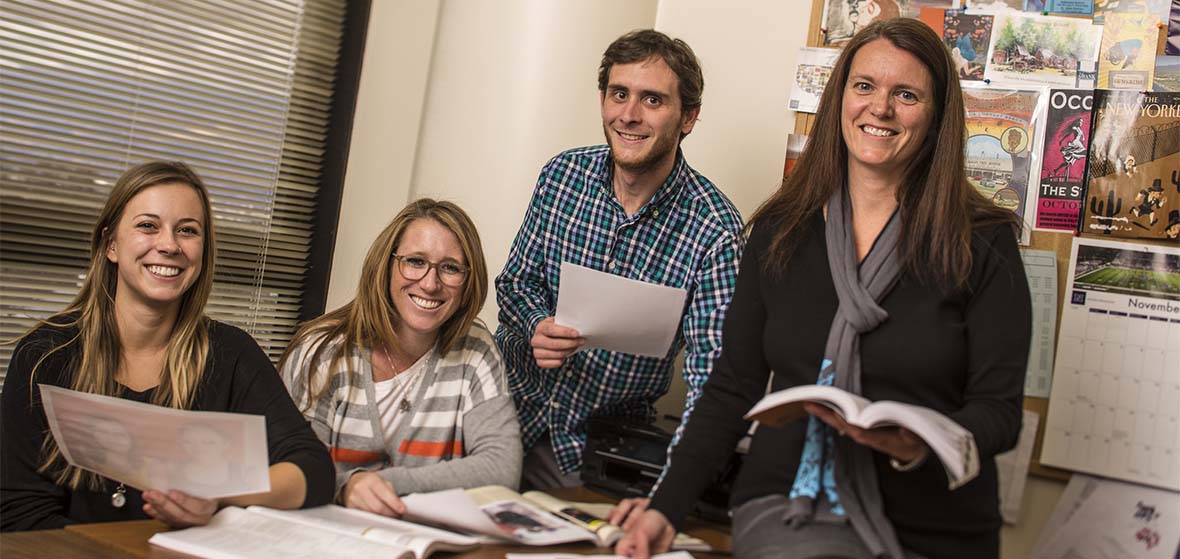The University of Nevada, Reno has seen success for the fifth consecutive year, as 12 students from Professor Jenanne Ferguson's Introduction to Cultural Anthropology course were awarded for their opinion essays submitted for the Community Action Project competition. The competition is put on by the Center for a Public Anthropology, and involves more than 4,000 students from 24 schools across the country, including Canada.
"I was really impressed how they came through," Ferguson, assistant professor of anthropology in the College of Liberal Arts, said. "And, the fact that these 12 students were from a wide variety of fields; I think that the greatest success was for the students who are not necessarily wanting to be anthropologists."
The scope of the competition was to give students the chance to think critically about pressing ethical issues, all while strengthening their writing skills. But, the wide variety of fields added a special meaning to the competition and to its winners. Having these non-anthropological students understand these issues is something that the director, Rob Borofsky, at the Center for a Public Anthropology wants for students.
"Anthropology needs to get out of the 'ivory tower' aspect; that we can't just do anthropology for anthropologists," Ferguson said. "The Center wants to emphasize, especially at an introductory level, that students need to start thinking anthropologically because anthropological thinking can be useful to anybody, no matter what field they are in." said Ferguson.
Sephra Lall, one of the 12 student winners, is pursuing her degree in neuroscience with a minor in international affairs. Lall believes that the course prepared her very well for the competition because the lessons and discussions made the concepts easy to grasp.
"I think this competition helps students by letting them be able to express what they've learned in the class to their best ability," Lall said. "Specifically, it helped me show my true ability and knowledge as well as my strengths; I was able to see my hard work pay off."
The competition asked students to give their opinion regarding the Institutional Review Boards (in the United States) and/or Review Ethics Boards (in Canada), and if they should enforce a set of common rules regarding research. Students were also asked how much freedom researchers should be allowed when conducting research, and what regulations should be enforced to prevent the abuse of research subjects and ensure that the research strives to promote positive benefits for the larger society sponsoring it.
The essays are submitted online, and then the students are able to peer-evaluate each other's essays. This process lets students learn their peers' thinking process, allowing critical thinking and understanding overall. After the peer evaluation, the students have the option to submit their essays to policymakers and legislators. The essays are then sent over to the Center for a Public Anthropology where the top five percent of the thousands of essays are given to Borofsky for the final decision of the winners.
The 12 student winners from the University finished in the top five percent of the thousands of student participants.
"It is fairly significant - it's not just the top 12 in my class, they are some of the top throughout," Ferguson said. "I don't know if the students realize that it's that big of a deal, but it really is. It does show that they have engaged with not only the material in the class, but that they are able to take it and apply it and think critically."
In addition to Lall, the University student winners include: Melissa Johnston, Victor Sutton, Alyssa Dubois, Augustine Au, Nikolas Rodrigue, Khaleel Jett, Emy Fellous, Madeline Marotto, William Kilroy, Atrina Behmaram and Alexander Rada.
Many University professors have submitted and won awards from the Center in each of the five past years. The opinion essays from these students can be read at the Center for a Public Anthropology's website.
NevadaToday
University students recognized in top 5 percent of national competition winners
12 students awarded in the Public Anthropology writing competition; University continues 5-year streak of success












